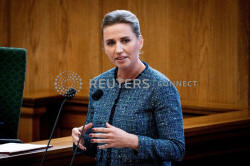Denmark's new government to boost spending after years of austerity
 Send a link to a friend
Send a link to a friend
 [October 02, 2019] By
Jacob Gronholt-Pedersen [October 02, 2019] By
Jacob Gronholt-Pedersen
COPENHAGEN (Reuters) - Denmark's new Social
Democratic government said on Wednesday it would pour more money into
healthcare, education and the welfare system, following through on its
campaign pledge to reverse years of cuts by previous administrations.
The government said it had room to manoeuvre on spending because
Denmark's public finances were in good shape after years of austerity
and that it would also raise taxes on businesses to help pay for the
policy shift.
The Social Democratic Party, the main architect behind the creation of
Denmark's cradle-to-grave welfare state in the 20th century, won power
in a June 5 election as voters rebelled against austerity and the rise
of right-wing nationalists.

Many Danes, who pay some of the highest taxes in the world to fund their
welfare system, are concerned that further spending cuts would erode the
country's long-cherished universal healthcare, education and services
for the elderly.
The government led by Prime Minister Mette Frederiksen said it would
channel an extra 5.4 billion crowns ($789 million) into welfare next
year, including hiring 1,000 new nurses, supporting poor families, and
increasing spending on education.
The spending measures will push Denmark's budget into a deficit of 0.1%
of gross domestic product next year, though it will still be well below
the European Union limit of 3% and comes after a surplus of 0.2% in
2018.
"With some of the healthiest public finances in Europe, Denmark is able
to loosen its fiscal policy as the ECB (European Central Bank) has urged
EU states to do. On the other hand, the Danish economy is not really in
need of any fiscal boost," Danske Bank economist Las Olsen said.
[to top of second column] |

Danish Prime Minister Mette Frederiksen speaks at the opening of the
Danish Parliament (Folketinget) at Christiansborg Palace in
Copenhagen, Denmark, October 1, 2019. Ritzau Scanpix/Niels Christian
Vilmann via REUTERS/File Photo

Austerity measures brought in by right-leaning governments have helped Denmark
recover from the financial crisis a decade ago. Last year, Denmark's economy
grew by 1.5% and the government expects growth of 1.7% this year and 1.6% in
2020.
The government said it would give the country's tax agency, which has come under
fire after 12.7 billion crowns in revenue were lost in a financial market scam,
an extra 1.5 billion crowns next year to combat fraud.
It will also bring back an inheritance tax that has been opposed by business
owners and higher duties on cigarettes and other goods.
Frederiksen, who at 41 is Denmark's youngest prime minister, has also taken a
tough stance on immigration and her government abolished a plan for a refugee
exit center that would house foreign criminals on a tiny island.
The minority government will now negotiate the budget proposal with its
left-wing allies that have called for more welfare and a halt to the economic
reforms they say have increased inequality in the Nordic country.
(Reporting by Jacob Gronholt-Pedersen; editing by David Clarke)
[© 2019 Thomson Reuters. All rights
reserved.] Copyright 2019 Reuters. All rights reserved. This material may not be published,
broadcast, rewritten or redistributed.
Thompson Reuters is solely responsible for this content.
 |